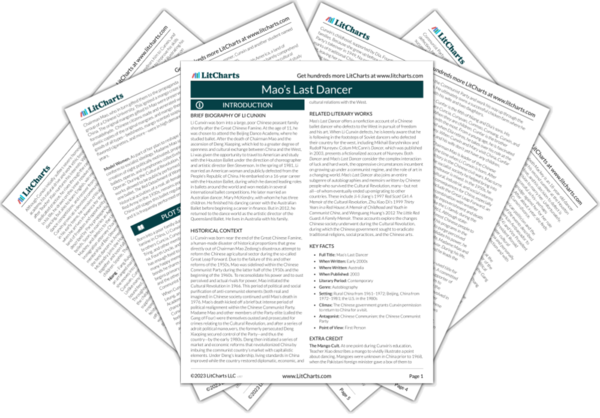Mary McKendry Quotes in Mao’s Last Dancer
And when Romeo mistakenly believed that Juliet was dead, all the sorrow and despair I had ever experienced in my life overwhelmed me. I thought of the years of separation from my parents, of fearing for my life in that small room in the Chinese consulate. I thought of life without Mary, I thought of the greatest sacrifice one could make, to take one’s life for the sake of love. When Juliet finally plunged Romeo’s knife into her heart and closed her eyes forever, there was not a sound from anyone in the entire theater, only the soul-wrenching music playing to the end. Then suddenly the audience erupted into applause. I didn’t want it to end. I’d tasted the delicious feeling of the ultimate performance; the performance of my life. Another moment to treasure forever.

Unlock explanations and citation info for this and every other Mao’s Last Dancer quote.
Plus so much more...
Get LitCharts A+“Mary, can you have six extra boys and give us one each?” another sister-in-law asked, and everyone laughed. Deep inside, however, I knew how they felt. Not producing a son to continue the family line was considered the worst betrayal of your ancestors […] I looked at my third brother’s beautiful daughter, Lulu, then looked at my nephew and my other nieces. I felt sad that they, like most of the next generation of children growing up in China, would have no brothers or sisters. We had survived through generations of dark and impoverished living because of this one strength, because of the unconditional love and unselfish care of each other within our family unit. It was all we’d had.
“I’m only one of millions of victims,” my brother explained to Mary. “I am, like so many people in China, still amazed at how badly I was manipulated and betrayed by Mao and the Gang of Four. The Red Guards of yesterday were the epitome of the communist spirit. Now we are searching for answers. We have to live with our injured pride and lost beliefs.”
I felt so much sorrow for Cuncia. I knew what he said was true—he had spent the best part of his youth pursuing nothing but propaganda. But the Cultural Revolution didn’t just rob him of his youth; it crushed and destroyed his spirit and his soul. His trust in society had vanished. Even his sacred family values had been called into question by Mao and the Cultural Revolution.

Mary McKendry Quotes in Mao’s Last Dancer
And when Romeo mistakenly believed that Juliet was dead, all the sorrow and despair I had ever experienced in my life overwhelmed me. I thought of the years of separation from my parents, of fearing for my life in that small room in the Chinese consulate. I thought of life without Mary, I thought of the greatest sacrifice one could make, to take one’s life for the sake of love. When Juliet finally plunged Romeo’s knife into her heart and closed her eyes forever, there was not a sound from anyone in the entire theater, only the soul-wrenching music playing to the end. Then suddenly the audience erupted into applause. I didn’t want it to end. I’d tasted the delicious feeling of the ultimate performance; the performance of my life. Another moment to treasure forever.

Unlock explanations and citation info for this and every other Mao’s Last Dancer quote.
Plus so much more...
Get LitCharts A+“Mary, can you have six extra boys and give us one each?” another sister-in-law asked, and everyone laughed. Deep inside, however, I knew how they felt. Not producing a son to continue the family line was considered the worst betrayal of your ancestors […] I looked at my third brother’s beautiful daughter, Lulu, then looked at my nephew and my other nieces. I felt sad that they, like most of the next generation of children growing up in China, would have no brothers or sisters. We had survived through generations of dark and impoverished living because of this one strength, because of the unconditional love and unselfish care of each other within our family unit. It was all we’d had.
“I’m only one of millions of victims,” my brother explained to Mary. “I am, like so many people in China, still amazed at how badly I was manipulated and betrayed by Mao and the Gang of Four. The Red Guards of yesterday were the epitome of the communist spirit. Now we are searching for answers. We have to live with our injured pride and lost beliefs.”
I felt so much sorrow for Cuncia. I knew what he said was true—he had spent the best part of his youth pursuing nothing but propaganda. But the Cultural Revolution didn’t just rob him of his youth; it crushed and destroyed his spirit and his soul. His trust in society had vanished. Even his sacred family values had been called into question by Mao and the Cultural Revolution.











